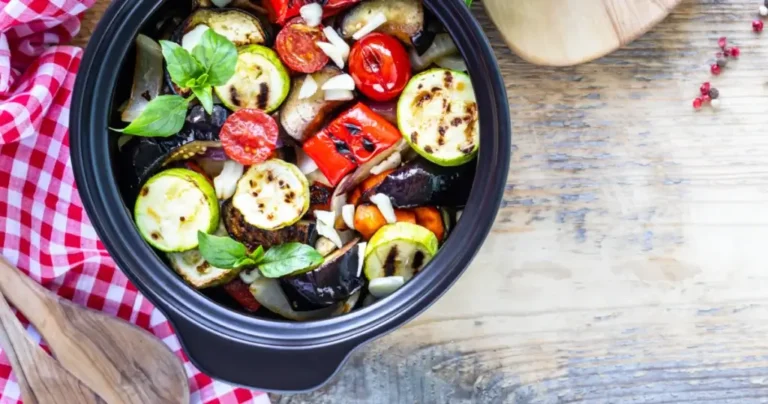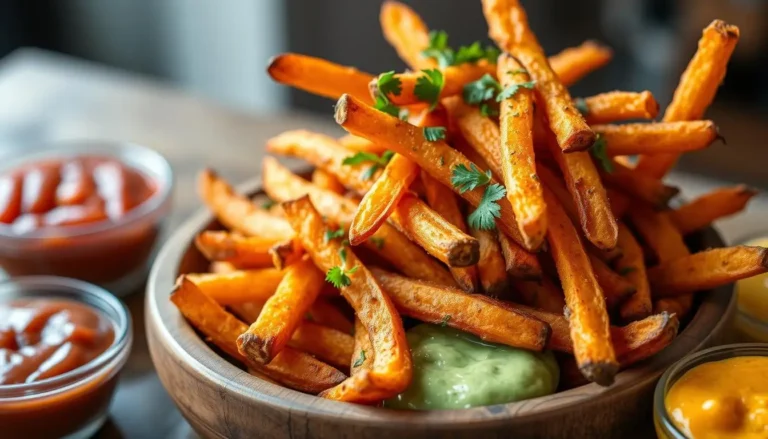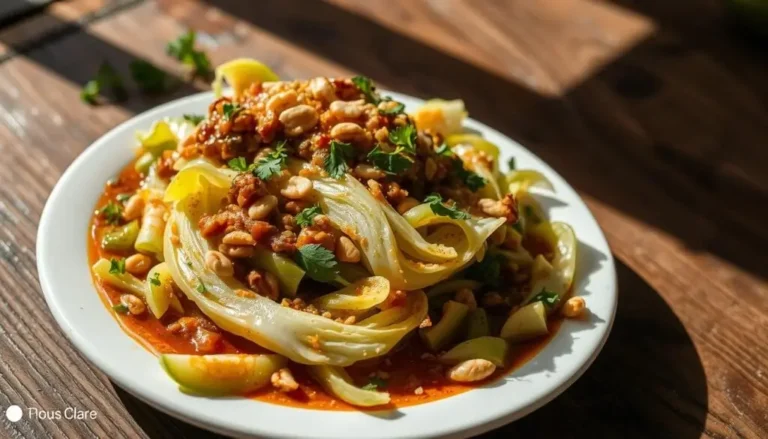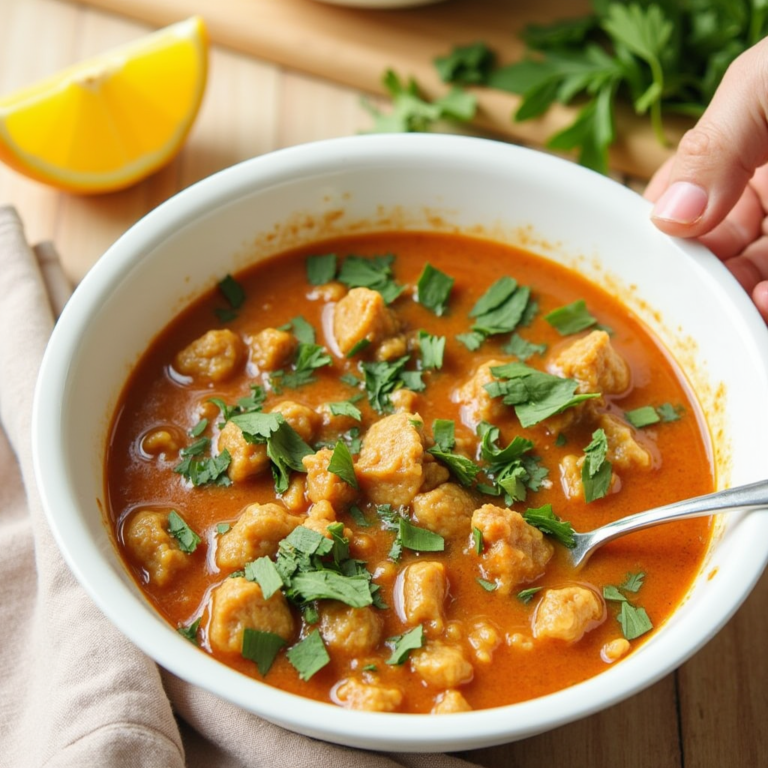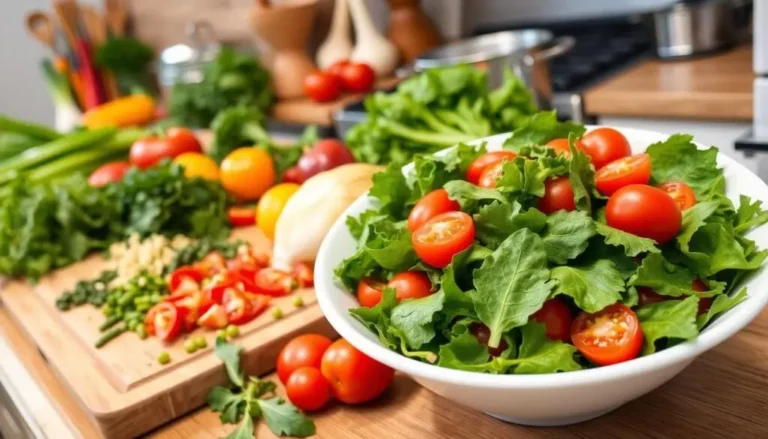Best Healthy Vegetarian Meals for a Balanced Diet
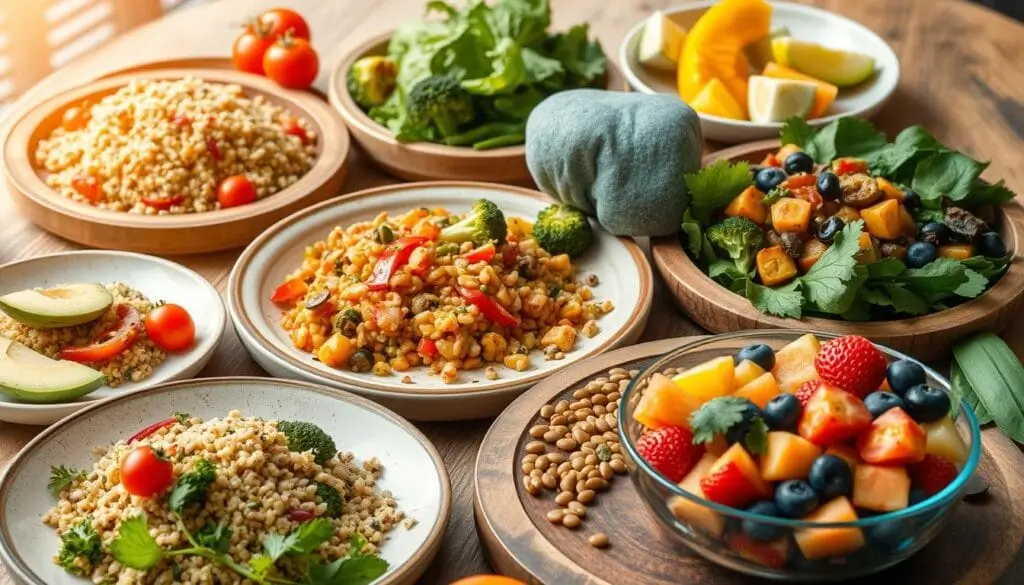
Table of Contents
Food has always been my gateway to wellness. Discovering healthy vegetarian meals changed how I see nutrition. I started with curiosity about plant-based nutrition, looking for a diet that’s good for both body and soul.
Vegetarian diets are a great way to get healthy. They mix tasty flavors with great nutrition. These diets include grains, pulses, nuts, seeds, veggies, and fruits. They create a colorful world of taste and health.
Exploring healthy vegetarian meals can open up new possibilities for your nutrition. With over 20 vegetarian meal recipes that meet American Heart Association standards, you’ll see how plant-based eating can change your health approach.
Understanding the Fundamentals of Vegetarian Nutrition
Exploring vegetarian nutrition opens up a world of healthy eating possibilities. Your journey into plant-based diet essentials begins with understanding the core principles of balanced vegetarian nutrient intake.
Types of Vegetarian Diets
Vegetarian diets come in various forms, each with its own nutritional approach:
- Lacto-ovo-vegetarian: Includes dairy and eggs
- Lacto-vegetarian: Includes dairy products only
- Ovo-vegetarian: Includes eggs only
- Vegan: Excludes all animal products
Essential Nutrients for Vegetarians
Achieving optimal vegetarian nutrition requires careful attention to key nutrients:
- Protein from beans, lentils, nuts, and soy
- Iron through leafy greens and fortified foods
- Vitamin B12 from supplements or fortified products
- Calcium from dairy alternatives and leafy vegetables
- Omega-3 fatty acids from chia seeds and walnuts
Daily Nutritional Requirements
Your vegetarian diet can meet daily nutritional needs with strategic planning. For a moderately active adult, consider these guidelines:
| Nutrient | Daily Recommendation |
|---|---|
| Energy | 2000 kcals |
| Protein | 50-60g |
| Carbohydrates | 260g |
| Fiber | 25-30g |
“Nutrition is not about being perfect. It’s about eating food that makes you feel great.” – Maya Angelou
Remember, portion sizes can be personalized using simple hand measurements. A fist-sized portion works well for carbohydrates, while a palm-sized portion suits protein sources.
Benefits of Following a Plant-Based Diet
Looking into vegetarian health benefits shows a strong way to improve your well-being. Today, many Americans focus on health and nutrition. They see the benefits of eating more plants.
Choosing a meatless diet can make you healthier in many ways. Studies have found some great benefits:
- Lower risk of chronic diseases
- Better weight management
- Lower cholesterol levels
- Improved heart health
A 2020 study of 19 research papers found that plant-based diets help people lose more weight. Nutritional science keeps showing the amazing benefits of vegetarian eating.
“Your food choices impact not just your health, but the health of the planet.” – Nutrition Expert
Vegetarian health benefits go beyond just personal health. A study from Oxford University found that eating more plants can save you money. It also helps the environment.
| Health Benefit | Potential Impact |
|---|---|
| Heart Disease Risk | Significantly Reduced |
| Weight Management | Improved Control |
| Chronic Disease Prevention | Enhanced Protection |
By choosing a plant-based diet, you’re doing more than just improving your health. You’re joining a worldwide effort towards eating better and greener. This benefits both you and the planet.
Building Balanced Vegetarian Plates
Making balanced vegetarian meals is like creating art. It’s about mixing nutrition, taste, and looks. Your plate can show off health when you know how to plan vegetarian meals.
The Plate Method is a simple way to make healthy plant-based meals. Let’s look at what makes a balanced vegetarian plate:
Plant-Based Protein Sources
Protein is key for vegetarian diets. Your plate should have different plant-based proteins for all amino acids:
- Legumes (beans, lentils, chickpeas)
- Tofu and tempeh
- Nuts and seeds
- Edamame
- Peas
Complex Carbohydrates
Whole grains are the base of healthy vegetarian meals. Add these complex carbs:
- Quinoa
- Brown rice
- Whole wheat pasta
- Oats
- Sweet potatoes
Healthy Fats Selection
Healthy fats help with nutrient absorption and health. Choose whole foods like:
- Avocados
- Olive oil
- Coconut products
- Nuts
- Seeds
“Aim for 80% plate accuracy with the Plate Method, allowing 20% flexibility for enjoyable foods.” – Nutrition Expert
By following these tips, you can make balanced vegetarian meals that are both healthy and tasty. Remember, planning vegetarian meals is about variety, nutrients, and enjoying your food.
Healthy Vegetarian Meals for Breakfast
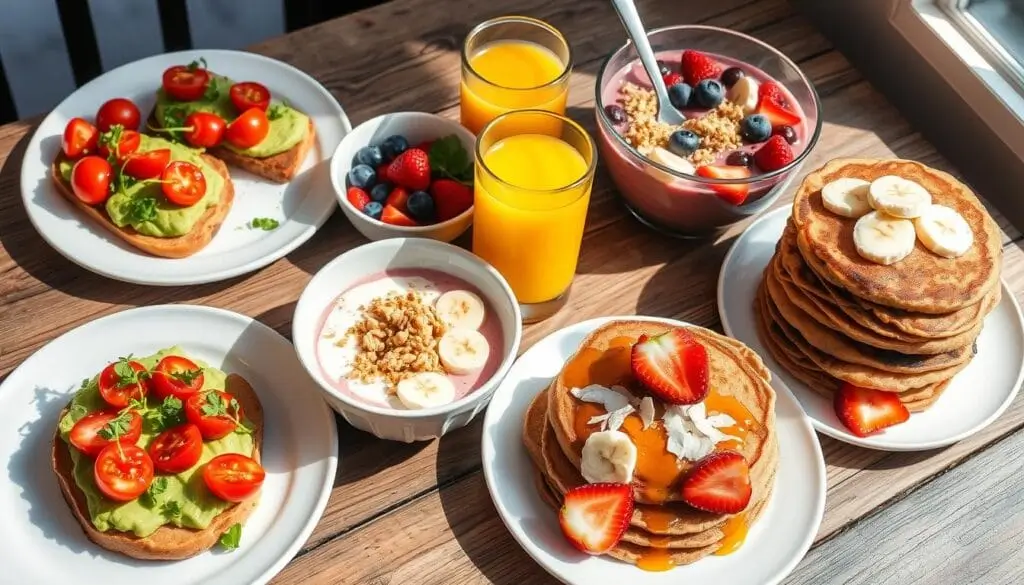
Starting your day with vegetarian breakfast ideas can change your morning. Plant-based meals are nutritious and keep you full all day. They’re great for anyone, whether you’re a vegetarian or just want to try something new.
Protein-rich vegetarian breakfasts help you stay energized. Here are some tasty morning meal ideas:
- Strawberry Overnight Oats (352 calories, 10g protein)
- Tofu Scramble with Roasted Vegetables
- Whole Grain Toast with Nut Butter and Fresh Fruits
- Spinach Protein Pancakes
- Herbed Onion Bagels with Vegetable Spreads
If you don’t eat dairy, there are plant-based options that are just as good. Try different recipes to find your favorite vegetarian breakfast.
“Breakfast is the most important meal of the day – make it count with nutritious, delicious vegetarian options!” – Nutrition Expert
Here’s a quick look at some popular vegetarian breakfasts:
| Breakfast Option | Calories | Protein | Carbohydrates |
|---|---|---|---|
| Mixed Berry French Toast Bake | 310 | 13g | 46g |
| Roasted Vegetable Strata | 349 | 17g | 40g |
| Basil Vegetable Strata | 322 | 24g | 28g |
Pro tip: Make overnight recipes like strawberry oats or vegetable stratas. They save time and ensure a healthy, tasty start to your day.
Power-Packed Vegetarian Lunch Ideas
Making tasty vegetarian lunches is easy. Plant-based meals are full of nutrients and flavor. They’re great for work or home, keeping you full and focused all day.
Quick Office Lunch Options
Busy people can enjoy quick, tasty vegetarian lunches. Here are some high-protein choices:
- Hummus and veggie wraps with mixed greens
- Grain bowls with roasted seasonal veggies
- Mediterranean pita pockets with quick-pickled veggies
Make-Ahead Meal Prep Solutions
Meal prep changes how you think about lunch. Try these easy options:
- Lentil and veggie soup (15+ grams of protein)
- Quinoa salad with black beans and roasted veggies
- Vegan Buddha bowl with microwavable quinoa
Wholesome Sandwich Alternatives
Look beyond traditional sandwiches for meatless lunch ideas:
| Dish | Protein Content | Preparation Time |
|---|---|---|
| White Bean & Avocado Sandwich | 18g protein | 10 minutes |
| Stuffed Sweet Potato with Black Beans | 15g protein | 20 minutes |
| Baked Falafel Sandwich | 16g protein | 25 minutes |
“Eating vegetarian doesn’t mean sacrificing flavor or nutrition. It’s about creativity and balance.” – Culinary Nutritionist
Vegetarian lunches can be both tasty and healthy. Try new ingredients and flavors to keep your meals exciting.
Nutritious Plant-Based Dinner Recipes
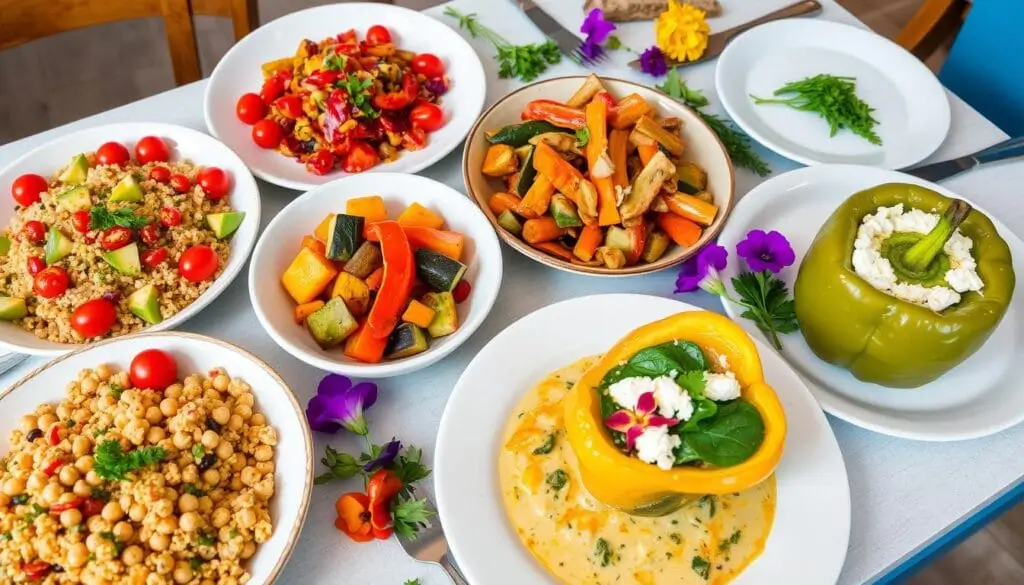
Exploring vegetarian dinner ideas can make your evening meals both healthy and tasty. Plant-based recipes open up a world of flavors. They satisfy your taste buds and give you the nutrients you need.
Meatless meals can be both tasty and full of nutrients. Let’s look at some amazing options that will make your dinner exciting and good for you.
Top Vegetarian Dinner Recipes
- Creamy Pesto Pasta: A favorite that shows plant-based meals can be very satisfying
- Lentil and Vegetable Soup: A filling one-pot meal full of protein
- Sweet Potato and Black Bean Chili: Full of flavor and nutrients
- Mushroom Shawarma with Tahini Sauce: A creative take on classic flavors
These plant-based recipes show the wide range of vegetarian cooking. You’ll find quick meals and more complex dishes to suit any taste and schedule.
“The most delicious pesto recipe I’ve ever had!” – A satisfied home cook
Key Ingredients for Success
- Protein-rich ingredients like tofu, quinoa, and chickpeas
- Nutrient-dense vegetables such as kale, mushrooms, and sweet potatoes
- Flavorful seasonings including chili powder, cumin, and chipotle peppers
Whether you’re a seasoned vegetarian or just starting, these recipes have something for you. Try different cooking methods like sautéing, roasting, and simmering. This way, you can make exciting plant-based meals that will wow your family and friends.
Smart Snacking for Vegetarians
Finding tasty and healthy vegetarian snacks is easy. The snacks you choose are key to feeling good. They help keep you full and support your health.
Energy-Boosting Options
Need a snack between meals? Go for something that’s both tasty and nutritious. Here are some great choices:
- Nuts and seeds mixed with dried fruit (research shows nuts may help with weight management)
- Greek yogurt topped with mixed berries for protein and antioxidants
- Chia seed pudding loaded with omega-3 fatty acids
- Edamame – providing around 18 grams of protein per cup
- Homemade kale chips with a sprinkle of olive oil
Portion Control Guidelines
It’s not just about what you eat, but how much. Most snacks should be under 200 calories. Here’s how to keep it right:
- Measure nuts in a small handful
- Use a small bowl for yogurt or cottage cheese
- Pre-portion energy bars and granola snacks
- Create frozen “smoothie packs” for quick preparation
Healthy Sweet Alternatives
“94 percent of mothers rank almonds as the healthiest snacking option”
Want something sweet? Try these healthy options:
- Baked fruit with cinnamon
- Homemade energy balls with dates and nuts
- Smoothies with natural fruit sweetness
- Granola bars with cranberries and chia seeds
Choosing healthy snacks is about taking care of your body. Enjoying tasty, meatless snacks makes you feel amazing.
Meal Planning and Prep Strategies
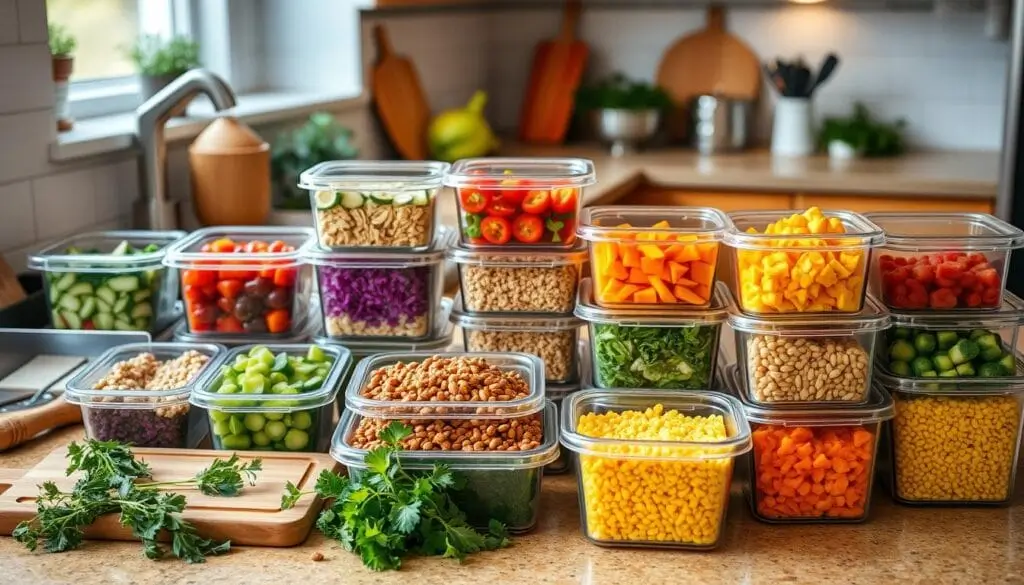
Learning to prep vegetarian meals can change your cooking week. Planning your meals with plants saves time and stress. It also makes sure you always have healthy food ready.
Start your vegetarian meal prep with these key strategies:
- Choose versatile base ingredients like quinoa, rice, and lentils
- Batch cook protein-rich components in advance
- Invest in quality storage containers
- Prep ingredients for multiple meals at once
Pro tip: Roast vegetables in large batches to streamline your vegetarian meal planning process.
“Preparation is the secret ingredient to successful plant-based meal planning.” – Vegetarian Nutrition Expert
Here are some ways to save time on meal prep:
- Chop vegetables in advance
- Cook grains in bulk
- Prepare versatile sauces and dressings
- Pre-portion meals for easy grab-and-go options
| Meal Prep Item | Storage Duration | Nutrition Highlights |
|---|---|---|
| Quinoa Salad | 5 days | High protein, 14g protein per serving |
| Lentil Curry | Freezer-friendly | Rich in fiber and plant-based protein |
| Vegetable Roast | 4 days refrigerated | Low calorie, nutrient-dense |
By using these vegetarian meal prep tips, you’ll make tasty, healthy meals. You’ll save time and reduce cooking stress. Try out different recipes to find your favorite plant-based meal planning way.
Essential Pantry Staples for Vegetarian Cooking
Having the right vegetarian pantry essentials can change your cooking. A well-organized plant-based kitchen means you’re always set for tasty, healthy meals.
Dried and Canned Goods
Your pantry should have a good mix of legumes and grains. Here are some key items:
- Beans: Black beans, cannellini beans, chickpeas
- Lentils: Red, green, and brown varieties
- Canned tomatoes: Whole, crushed, and paste
Protein-Rich Ingredients
Protein is key for a balanced vegetarian diet. Make sure to have these protein-rich foods:
| Protein Source | Serving Suggestions |
|---|---|
| Tofu (Silken and Firm) | Stir-fries, scrambles, grilling |
| Nutritional Yeast | Cheese-like seasoning, sauce base |
| Nuts and Seeds | Snacking, salad toppings, baking |
Fresh Produce Must-Haves
A lively vegetarian kitchen needs fresh, colorful foods:
- Leafy greens: Spinach, kale, arugula
- Seasonal vegetables
- Herbs for fresh flavor
“A well-stocked pantry is the secret to effortless vegetarian cooking.” – Plant-Based Chef
With these pantry essentials, you can cook delicious, healthy meals easily and creatively.
Conclusion
Starting a balanced vegetarian diet is more than just a food choice. It’s a way to improve your health and well-being. Eating less meat can lower your risk of heart disease and help you manage your weight.
Choosing vegetarian meals also helps the planet. It reduces greenhouse gas emissions and protects our biodiversity. Plus, plant-based foods are often cheaper and produce less waste than meat.
Planning is key to a successful vegetarian diet. Make sure you get enough protein, vitamins, and minerals. This includes Vitamin B12 and iron. With a little creativity, you can make tasty, healthy vegetarian meals.
Your decision to eat vegetarian is a big step for your health and the planet. By knowing what you need and using a variety of plant-based foods, you can live a healthy and vibrant life.
FAQ
What are the different types of vegetarian diets?
Can a vegetarian diet provide all essential nutrients?
What are the health benefits of a vegetarian diet?
How can I ensure I’m getting enough protein as a vegetarian?
What are some quick vegetarian lunch ideas?
How do I create a balanced vegetarian plate?
What are some essential pantry staples for vegetarian cooking?
How can I plan and prep meals as a vegetarian?
What are some healthy vegetarian snack ideas?
Can vegetarian diets be suitable for all ages and activity levels?
Have you cooked any of our recipes yet?
There are no reviews yet. Be the first one to write one.

